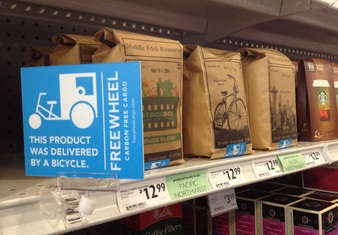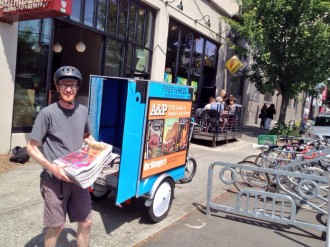
You’re just trying to pick up some coffee from the grocery store on your way home, but now you find yourself overwhelmed with options. This bag is organic, these are Fair Trade, the beans in this one are green (I don’t think my French press can handle those).
That’s when you notice a label next to a bag from Middle Fork Roasters: “This product was delivered by a bicycle.”
As we reported in April, Freewheel is a young company that makes deliveries using a cargo-hauling electric-assist box bike (technically, a tricycle). While making deliveries by bike is nothing new, Freewheel’s highly visible bike and big cargo space make it stand out and expand the number of things than can be effectively moved by bike.

Since launching in the spring, Freewheel has grown and taken on new customers. In fact, if you have picked up a copy of The Stranger in the Central District or Capitol Hill, it’s possible they delivered your paper.
There are public benefits to bike delivery, including reduced traffic and air pollution. While bikes are not going to replace large regional distribution trucks at big grocery and retail stores any time soon, they can be a great alternative for local companies trying to make deliveries in the company van or truck. A delivery switched to bike is one less van vying for precious drop-off parking spaces (or, not finding one, deciding to park illegally in a bike lane or center turn lane).
And since bike delivery works best in the same dense areas that are difficult for van deliveries, it’s a practical solution for many companies.
Indeed, it must be catching on, because Freewheel is hiring delivery staff.
Hopefully Freewheel is just the start of a big change in the way local goods move around Seattle’s increasingly dense neighborhoods and commercial districts. And maybe product labeling is one way to speed up the shift to bike delivery and make people think not only about how the things they buy are made, but also how they got here.
What do you think? Would you be more likely to choose an item if you knew it was delivered by bike?








Comments
9 responses to “Was this item delivered by bike? The next step in product labeling”
I would definitely be more likely to order a product if I knew it was delivered by bike. I hope someone in Portland starts making up these labels. We have a lot of companies using bikes for delivery.
Honestly, I think this is just like GMO labeling: more likely to result in elitist conspicuous consumption than significant positive change in supply chain and delivery practices. The real world speaks the language of money — align environmental and social good with price signals and we can have more faith in all the things we have to buy.
Middle Fork Roasters makes some tasty coffee, though.
Dude, if it gets one delivery van out of the way of my search for a parking space, I’m cool with it.
My car doesn’t fit on a bike rack…
[…] I can get behind a This product was delivered by a bicycle […]
I think this is a great way to support the trailblazing businesses. But I agree that this is perhaps not the right longer term model. But I do think that that something along these lines could likely be created that would be A Good Thing(TM).
People buy organic in part because it is better for the earth. But if you buy an organic tomato from New Zealand that was shipped across the ocean on a diesel cargo ship and then across the country on diesel trucks, that is Less Good(TM) than an organic tomato from a local farm that was driven 30 miles to the farmers’ market on the farmer’s truck.
I would probably support and make use of something like a “carbon footprint” label (not just for foods) so I can choose the products that had the least impact on the earth in that respect. That would potentially encourage local production and packaging and buying from local farmers and have a significant impact on how much fuel the country uses for transporting goods.
> But if you buy an organic tomato from New Zealand that was shipped across the ocean on a diesel cargo ship… that is Less Good(TM)…
Agreed. It doesn’t look like they plan on dealing with produce (because, esp. for tomatoes, that’s just silly) but for things like coffee, that could be shipped via sailing boats: http://sailingdog.org/
If a product is delivered by an “electric-assist” bike, isn’t a “delivered by bike” label as deceptive as if it had been delivered by an electric or even a gas powered motorcycle? In truth, the product was delivered by a low-powered motor vehicle.
I’m fairly certain that many (most?) e-assist bikes store power generated by a dynamo hub, which is then tapped into by the rider as needed. That’s not entirely direct human power, but certainly approaches near-zero-carbon.
Well, as zero-carbon as the cyclist’s food supply. Which is to say, not zero-carbon at all.